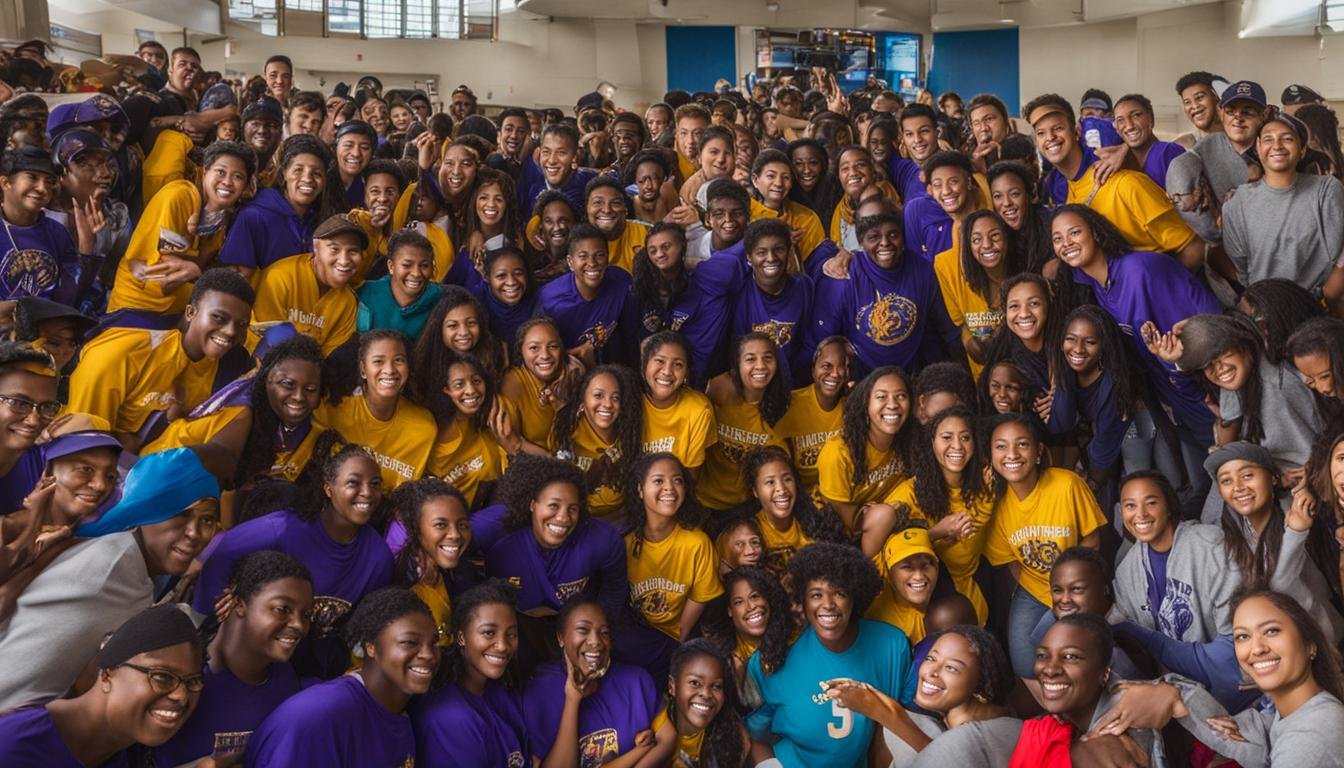Are you looking to make the most of your college experience? On-campus involvement through extracurricular activities is the key to unlocking a world of opportunities and personal growth. The value of extracurricular activities in college cannot be overstated, as they offer numerous benefits that go beyond the classroom. From joining clubs to participating in various on-campus initiatives, these activities provide a platform for you to develop essential skills, enhance your academic performance, and prepare for future success.
When you engage in extracurricular activities, you become part of a vibrant community that fosters teamwork, competition, and individual initiative. These activities reinforce skills taught in the classroom while providing real-world applications. The interpersonal communication skills you develop through interactions with teammates, coaches, and advisors are highly sought after in today’s job market.
Research shows that participating in extracurricular activities positively impacts student success. It is associated with higher academic performance, greater likelihood of attending college, and lower dropout rates. These activities also contribute to a sense of belonging and acceptance within the school community, leading to increased school attendance and attachment.
Moreover, on-campus involvement provides opportunities for you to develop essential skills that are valuable in the professional world. You will learn the importance of teamwork, collaboration, and effective time management as you balance your academic workload with extracurricular commitments. These are skills that employers look for in their ideal candidates.
When it comes to college admissions, extracurricular activities can set you apart from other applicants. Admissions boards appreciate the initiative, commitment, and leadership demonstrated through involvement in clubs and organizations. Your achievements in these activities can make a positive impression and increase your chances of securing merit-based scholarships.
The options for extracurricular activities are vast and diverse. Whether you’re interested in academic clubs to deepen your knowledge, sports teams for physical fitness and teamwork, or volunteering and performing arts groups for personal growth and community contribution – there is something for everyone.
Don’t miss out on the incredible opportunities that extracurricular activities in college provide. Embrace on-campus involvement, enhance your skills, and create a well-rounded college experience that will pave the way for your future success.
Enhancing Skills Through Extracurricular Activities
Extracurricular activities provide a valuable opportunity for students to enhance various skills while enriching their college experience. These activities go beyond the traditional classroom setting, offering real-world applications that reinforce academic lessons and promote skills development.
One of the significant advantages of participating in extracurricular activities is the reinforcement of academic concepts. For example, joining business clubs can help students apply mathematical knowledge in a practical context. Working on real-world projects and engaging in hands-on activities within these clubs allows students to see the direct application of their classroom learning, reinforcing their understanding and deepening their knowledge.
In addition to academic reinforcement, extracurricular activities play a vital role in the development of communication skills. Collaborating with teammates, coaches, and advisors fosters effective interpersonal communication, teamwork, and problem-solving abilities. Through these interactions, students learn how to articulate their ideas, listen actively, and collaborate effectively to achieve shared goals.
Extracurricular activities encourage a collaborative and supportive environment, providing students with opportunities to refine their communication skills in a practical setting. These skills are highly valued in professional and personal contexts, as effective communication is essential for building relationships, resolving conflicts, and achieving common objectives.

The Impact of Extracurricular Activities on Student Success
Participating in extracurricular activities is more than just a way to have fun and make friends. Research has shown a strong positive correlation between student success and involvement in extracurricular activities. High school seniors who engage in these activities often experience higher academic performance, positioning them in the top 25% of their class in math and reading assessments. Not only that, these students also have lower dropout rates and are more likely to attend college.

Engaging in extracurricular activities has a profound impact on various aspects of a student’s educational journey. Firstly, it leads to improved school attendance as students become more motivated to participate actively in both academic and extracurricular pursuits. By immersing themselves in these activities, students develop a greater sense of belonging to the school community, fostering connections with like-minded peers and mentors. This sense of acceptance and community can contribute to a more positive and fulfilling educational experience.
Moreover, participating in extracurricular activities enables students to cultivate essential life skills that are crucial for success beyond the classroom. Skills such as time management, teamwork, and leadership are honed through these experiences, providing students with valuable assets as they transition into college and future careers. Employers and admissions boards often look favorably upon applicants who have actively participated in extracurricular activities, recognizing the valuable transferable skills gained through these engagements.
Overall, extracurricular activities play a vital role in shaping student success by enhancing academic performance, fostering a sense of belonging, and nurturing essential life skills. By getting involved in these activities, students not only broaden their horizons but also set themselves up for a successful future.
Developing Essential Skills Through On-Campus Involvement
Engaging in on-campus involvement activities, such as clubs and organizations, is a valuable way for college students to develop essential skills that are highly sought after in the professional world. These activities provide a platform for students to enhance their teamwork, time management, and leadership abilities, setting them up for long-term success.
Teamwork and Collaboration
On-campus involvement activities promote teamwork and collaboration as students work together towards common goals. Whether it’s working on a group project, organizing an event, or participating in a sports team, students learn to communicate effectively, delegate tasks, and compromise to achieve desired outcomes. These experiences not only strengthen interpersonal skills but also foster a deeper understanding of different perspectives, a crucial skill in any professional setting.
Time Management and Prioritization
Participating in extracurricular activities requires students to effectively manage their time and strike a balance between their academic responsibilities and their involvement commitments. By juggling multiple priorities, students develop strong time management skills, learn to prioritize tasks, and become adept at meeting deadlines. These skills are invaluable not only during college but also in the fast-paced, deadline-driven nature of the professional world.

Leadership Development
On-campus involvement activities provide students with ample opportunities to take on leadership roles. Whether it’s becoming a club president, organizing a fundraising campaign, or mentoring younger students, students can hone their leadership skills, learn to motivate and inspire others, and make a positive impact on their campus community. These experiences not only enhance their resumes but also equip them with the confidence and capabilities to lead in their future careers.
In conclusion, college students who actively engage in on-campus involvement activities have the opportunity to develop essential skills that are highly valued by employers. These activities foster teamwork, enhance time management abilities, and cultivate leadership potential. By participating in extracurricular activities, students not only enrich their college experience but also gain a competitive edge in the job market.
The Role of Extracurricular Activities in College Admissions
When it comes to college admissions, extracurricular activities can make a significant impact on your chances of acceptance. Admissions boards are not just interested in academic achievements; they also want to see well-rounded individuals who are actively involved in their communities and display a range of skills.
By participating in extracurricular activities, you demonstrate your dedication, initiative, commitment, and leadership qualities. Admissions officers recognize the value of these experiences, as they showcase your ability to balance multiple responsibilities and excel beyond the classroom.
Engaging in extracurricular activities can make you stand out from other applicants and leave a positive impression on the admissions committee. It shows that you are willing to go above and beyond the requirements of your coursework, indicating your passion and drive for personal and academic growth.
Furthermore, extracurricular achievements can significantly impact the decision-making process for merit-based scholarships. These scholarships are awarded to students who exhibit exceptional dedication and skills in areas beyond academics. By highlighting your extracurricular achievements, you demonstrate your unique abilities and potential to contribute to the college community.

Popular Extracurricular Activities for College Students
When it comes to extracurricular activities, college students have a plethora of options to choose from. Engaging in these activities not only provides a break from academic coursework but also offers opportunities for personal growth, skill development, and community engagement. Here are some popular extracurricular activities that college students can explore:
1. Academic Clubs:
Academic clubs allow students to delve deeper into their areas of study and engage in intellectual discussions. These clubs provide a platform for students to connect with like-minded individuals, expand their knowledge, and gain a deeper understanding of their chosen subjects. Whether it’s a debate club, science club, or language club, academic clubs foster a stimulating academic environment that complements classroom learning.
2. Sports Teams:
Sports teams offer more than just physical fitness. They provide an avenue for students to develop teamwork, discipline, and leadership skills. Whether it’s joining a varsity team or participating in intramural sports, being a part of a sports team promotes camaraderie, enhances time management skills, and fosters a sense of belonging within the college community.
3. Volunteering:
Volunteering allows college students to make a positive impact in their communities while gaining valuable life experiences. Whether it’s participating in community service projects, assisting in local nonprofits, or engaging in philanthropic activities, volunteering helps develop empathy, compassion, and a sense of social responsibility. It also provides opportunities for networking and building meaningful connections with individuals who share similar values.
4. Student Government:
Joining student government provides students with an opportunity to actively participate in shaping the college community. Through student government, students can get involved in decision-making processes, advocate for student interests, and organize events that enhance the overall college experience. This involvement not only helps develop leadership and organizational skills but also fosters a sense of civic engagement and responsibility.
5. Performing Arts Groups:
For students with creative inclinations, participating in performing arts groups such as theater, dance, or music ensembles can be a fulfilling extracurricular activity. These groups provide opportunities for artistic expression, self-confidence, and collaboration. Students can showcase their talents, cultivate their artistic abilities, and entertain audiences through various performances and productions.
6. Special Interest Clubs:
College campuses often have a variety of special interest clubs catering to diverse hobbies and passions. These can include photography clubs, culinary clubs, film clubs, or even gaming clubs. Special interest clubs provide a space for individuals to bond over shared interests, explore new hobbies, and build lasting friendships.
Engaging in extracurricular activities in college not only allows students to pursue their interests but also offers a chance to develop skills, contribute to the community, and create unforgettable memories. So, whether you choose to join an academic club, participate in a sports team, or get involved in other activities, make the most of your college experience by exploring the wide array of extracurricular opportunities available to you.
Conclusion
Participating in extracurricular activities during your college life is key to a well-rounded experience that goes beyond the classroom. These activities provide numerous benefits, including the development of essential skills, enhanced communication, and valuable experiences that can set you apart in the competitive job market.
Getting involved in extracurricular activities allows you to balance your academic pursuits with personal growth and social connections. By joining a club, playing a sport, or volunteering, you can acquire and hone skills that will prove invaluable in your future career. These activities provide opportunities for leadership, teamwork, and time management, which are highly sought after by employers.
Additionally, participating in extracurricular activities allows you to create lasting memories and form meaningful relationships with fellow students who share your interests. These experiences contribute to a vibrant college journey, fostering personal growth, and a sense of belonging within the campus community.
So, make the most of your college experience by actively engaging in extracurricular activities. Whether it’s joining an academic club, participating in a sports team, or volunteering for a cause you’re passionate about, these activities will not only enrich your college life but also equip you with the skills and experiences necessary for future success.
Source Links
- https://www.educationcorner.com/k12-extracurricular-activities/
- https://www.livecareer.co.uk/cv/extracurricular-activities-to-put-on-cv
- https://www.careeraddict.com/extracurricular-activities
